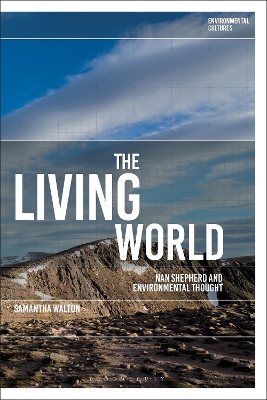Environmental Cultures
1 total work
Harnessing new enthusiasm for Nan Shepherd's writing, this book asks how literature might help us to reimagine humanity's place on earth in the midst of our ecological crisis. The first book to examine Shepherd's prose and fiction through an ecocritical lens, The Living World reveals forgotten details about the scientific, political and philosophical climate of early twentieth century Scotland, and offers new understandings of Shepherd's distinctive environmental thought.
With a focus on The Living Mountain, but touching upon The Weatherhouse, A Pass in the Grampians, poetry from In the Cairngorms, and Shepherd's personal archive, Samantha Walton explores how Shepherd's innovative and prescient nature writing can be better understood in light of new and multi-disciplinary environmental humanities approaches. More than this, this book proposes that Shepherd's ways of relating to complex, interconnected ecologies predate many of the core themes and concerns of current science, environmental cultural studies, and philosophy, and may inform their future development. Broken down into chapters focuses on themes of place, planet, ecology, environmentalism, Deep Time, vital matter and selfhood, The Living World offers the first integrated study of Shepherd's writing and legacy, making the work of this philosopher, feminist, amateur ecologist, geologist, and innovative modernist, accessible and relevant to a new community of readers.
With a focus on The Living Mountain, but touching upon The Weatherhouse, A Pass in the Grampians, poetry from In the Cairngorms, and Shepherd's personal archive, Samantha Walton explores how Shepherd's innovative and prescient nature writing can be better understood in light of new and multi-disciplinary environmental humanities approaches. More than this, this book proposes that Shepherd's ways of relating to complex, interconnected ecologies predate many of the core themes and concerns of current science, environmental cultural studies, and philosophy, and may inform their future development. Broken down into chapters focuses on themes of place, planet, ecology, environmentalism, Deep Time, vital matter and selfhood, The Living World offers the first integrated study of Shepherd's writing and legacy, making the work of this philosopher, feminist, amateur ecologist, geologist, and innovative modernist, accessible and relevant to a new community of readers.
